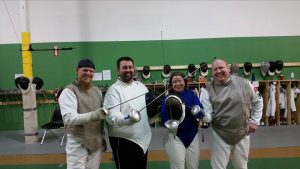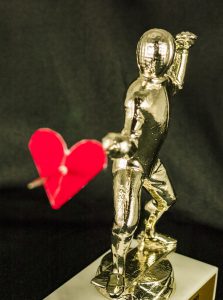
This is me on the left with my University of Montana fencing mates after we had just kicked the asses of our arch rivals at Montana State…on their turf.
Snapping a crisp salute by bringing his foil blade parallel to his unmasked face—inches from his nose—Dan’s grey eyes sharply gazed upon his opponent across the strip.
It was the final round of the men’s foil championship, and the winner would earn the national title.
Dan’s opponent returned a half-hearted salute without eye contact. It was dismissive and derisive of not only Dan but the moment.
This wasn’t another bout. This was the culmination of a lifetime of drills, learned strategy, conditioning, tournaments and the climax of a day of the most intense swordfighting against the best fencers in the country.
Both men were in peak condition and bone weary. Tired as he might be, Dan was elated to be 15 touches away from the national title. It was his life’s dream and sole desire since he started fencing in high school. He couldn’t wait to cram that weak salute down his opponent’s throat.
The director of the bout called the fencers to “en garde” and began the first of 3, 3-minute periods to 15 touches.
Only a junior in college, Dan understood he was fencing two opponents simultaneously: the man with the foil across from him and the bout director serving as referee.
Although the governing body of the sport in the U.S. rarely admitted it, Dan understood that no two directors interpreted the rulebook the same way, nor did they usually call the rules as they were written. As he hadn’t seen this director all day, Dan decided to take the first couple touches to learn his director’s style of rule interpretation.
His opponent obliged in the most comically sloppy way—a blazing running attack, his arm raised and cocked so far back that the electronic tip on the foil aimed at the wall behind the running fencer, 180-degrees in the opposite direction of Dan.
Dan held his ground and extended his sword arm at the center of his opponent’s exposed chest. The opponent impaled himself, and then flicked his own foil over Dan’s shoulder, landing a touch perfectly at the center of Dan’s back, which was a valid target.
Both men’s scoring lights and buzzers went off, registering valid touches. It was up to the director to decide.
Any spectator could see that in a real duel Dan would have run through his opponent’s heart, without so much as a scratch of damage to himself.
Yet, this was the 1990s, and even though the rulebook still declared the all-important rule of right-of-way as the first person to extend his or her weapon arm and threaten his or her opponent’s valid target area would have right-of-way and win the point if both fencers scored valid touches at the same time, the director ruled in favor of the now-smug opponent. Dan knew from experience that it was because the other fencer moved his feet first, even though he withdrew not only his arm but his entire foil behind his head. It was a flashier move, and after the 1980s, style always trumped substance.
A purist devotee of the sport, Dan hated the ruling, but he smiled because it only cost him one touch to learn how the rest of the bout needed to be fought.
His rival attacked three more times the same way. Three more times, Dan extended…BUT…at the last possible instant retreated 2 quick little steps, raised his arm and sword into a high tierce parry, dropping his foil back down, ever so gently tapping the electronic button on the tip of his foil into his opponent’s chest in riposte. In the psychological warfare of the moment, Dan said a cheery little “Bink” with each tap, fearlessly antagonizing his opponent.
Stripped of his primary attack, the flick artist wisely held back when fencing resumed. His goal was to draw Dan out to play offense and see if he could handle reverse roles.
With the 3-1 lead in his favor, Dan could afford to run down the clock, but that was hardly honorable, nor the way he wanted to win. The only way to have satisfaction would be a 15-point victory or go down trying.
Dan was a classically trained fencer, and he preferred outwitting his opponents and dominating conversations of blades instead of all-or-nothing power attacks. His first attack was really a cagey defensive maneuver testing both his opponent and his director.
Dan rushed his opponent with perfect footwork and a simple lunge that he knew his opponent could easily defend. Although he triggered the flicker’s defenses, Dan deliberately fell 1 inch short. This allowed Dan to witness his rival’s reaction time and motions, while giving Dan all the time he needed to retreat gracefully out of the way and counterparry-riposte for the point. As an afterthought, Dan’s opponent reached out and tagged Dan without any right-of-way in a move called a remise.
Two valid hit lights went off, and the director called the point for Dan’s opponent without any hesitation.
Disappointed, Dan wasn’t surprised. He knew he had the fastest, tightest parry-riposte reflex in the country and quite possibly the world. This was far from the first director to miss it.
Okay, Dan thought, I’ll just need to make my actions cleaner to the director with a little more style and panache.
Across the strip, Dan heard a little “Bink” in rebuke.
Surprising his opponent, Dan reacted with a deep and genuine laugh that forced him to cock his head back like a defiant Errol Flynn.
Game on, he thought.
In the resumption of play, Dan repeated every move perfectly—only this time holding his opponent’s blade in a slightly prolonged proof of parry before riposting.
Again, the director called the point in favor of the opponent’s remise.
One more time Dan executed to perfection, only parrying his opponent’s blade to the floor where Dan trapped it, made eye contact with the director and then riposted his opponent.
Again, the director credited his opponent’s remise. 3-4 in favor of the opponent.
Dan inhaled sharply and let it out slowly, as he walked back to his en garde line. With another deep breath, he collected himself. There was no such thing as an instant replay in fencing then and he thought to himself, Not at this level.
Then he rationalized, Especially at this level, you idiot.
Dan came to the sport of fencing only a few years earlier. Attending a local park district class in high school and then an extracurricular group at his university, Dan was from what the governing body of the sport and the elites from New York and California callously dismissed as fly-over country.
There were no former Olympians watching over his young career. He was a natural, and he loved the sport. He had an insatiable hunger to prove himself to be the best. His friends would never have considered him an athlete. He was a slow runner and didn’t like team sports. In school, he was a brain. He loved academics.
It was his brain that loved the sport so much, as it was a sport where the physically strongest fencer rarely won. The smartest fencer usually did.
He only enjoyed the conditioning and drills because they allowed his body to do whatever his brain commanded. Unlike so many fencers, he studied the sport inside and out from its history to obsessing over each opponent’s every move and nuance, memorizing them for each future tournament. His memory was deep and agile enough to recall the most minute details about an action and reaction on the strip. If he lost a bout, he always asked his opponents what they did to beat him. Some people might have thought him arrogant, but he wasn’t. He was a sponge constantly learning and very accepting of his own weaknesses, as only they showed him how much more he had to learn and perfect.
In college, the upperclassmen soon taught him everything they knew. He returned the favor by analyzing the team’s performance and creating new drills based on the moves their opponents beat them with. Everybody contributed equally as best they could, and they had the time of their lives together, traveling and competing, working as hard as they could to get better. Dan was so obsessed with the sport he began examining all of his classes for better ways to understand fencing through the lenses of psychology, philosophy, literature, science and more.
Dan improved so quickly that he came to love losing, as it meant there was more to be learned and do better against. The only thing he really hated was losing to bad officiating.
Nevertheless, to prove himself as good as he wanted, he refused to lay all the blame for an “officiating loss” on the director. If he truly wanted to be as good as he could be, that meant he couldn’t give them an excuse to deny his greatness.
With the bout now 4 to 3 against him, Dan realized that this director was never going to award any double-lighted actions in his favor, no matter how well he executed his maneuvers. There was an unspoken bias for fencers from elite academies over nobodies out of nowhere. Only making the task at hand more challenging, and, ultimately, more rewarding, Dan bore down with gritty determination. From this moment forward, he could only engage with actions that guaranteed a one-light resolution in his favor.
His opponent might have been a dismissive snob from an elite New York fencing academy, but Dan had to credit the man with being an amazingly talented competitor.
Together over the next three periods of fencing, they darted, lunged and entwined like rattlesnakes fighting over a mate, immune to one another’s venom.
Dan didn’t win a single point on a parry-riposte exchange that ended with two lights, but he listened to his opponent’s coach’s instructions. More than half the time, the coach gave away his student’s next move, setting up Dan for an easy touch.
As they made their way to a 14-14 tie, Dan discovered his rival’s greatest weakness. He had trouble defending a quadrant of his body fencers refer to as the 8—the rib cage just under this right-handed fencer’s sword-hand elbow.
Dan scored two touches there before realizing what an Achille’s heel it was. He refused to exploit the weakness immediately because he needed an ace to fall back on if he found himself in this very situation.
Chests heaving, their lungs incapable of sucking enough oxygen, uniforms sopped in sweat and muscles fading, both men had reach absolute exhaustion with one touch to go.
Dan gave a little hop at his en garde line, trying to psyche his opponent into thinking he had more energy than he did.
The director gave the command to fight.
Dan fleetly covered the ground between them, measured clockwise circles of his blade timed to his footfalls.
Feigning high toward his opponent’s left shoulder, Dan drew the parry response he wanted. Dan then cut down to the open space below his opponent’s elbow and lunged. His opponent knew Dan had him and freaked out, starting a late counter attack with no right of way. Dan timed his move so well that when his tip hit his opponent’s ribs, it would time out the scoring equipment.
Euphoria flooded Dan’s body for a nano-beat of a time, as he realized he was about to become the national champion.
It seemed like a lifetime of waiting for the point to strike home, and then he recognized his incomplete muscle control from exhaustion.
Dan’s tip was skewing wide. Trying desperately to redirect it into his opponent’s torso, Dan couldn’t override the momentum of his attack.
Time slowed in his whirring head, as his foil missed by less than an inch and his opponent’s act of desperation landed on his uniform.
To the world outside Dan’s mind, it all happened in the blink of an eye.
Dan’s opponent drown out the director’s final call by screaming, fist pumping and dancing about his half of the strip in the worst display of sportsmanship Dan had ever seen…though the governing body of the sport encouraged, as it looked more exciting to the cameras not yet covering the sport.
Determined to lose with as much grace and dignity as he intended to win, Dan blocked out his emotions, returned to his en garde line, removed his safety mask and snapped a crisp salute—his foil inches from his nose—and held it until his opponent finally made eye contact.
AUTHOR’S NOTE: Many of you know I was actively involved in the sport of fencing for 25 years. While the truths of the sport are valid in this story, this story was in no way autobiographical. I was never close to a national title. The best I ever did was 25th out of 200 at the 2001 U.S. Nationals in Div. 3 Men’s Foil. I lost to an elite NYC fencer, and he was actually the nicest guy I met all day, and he went on to take the title. That isn’t to say there aren’t a lot of elite fencers with attitude problems. A future (now former) olympian once brazenly mocked one of my students and cruelly rubbed in her 15 to 1 victory, even though my student was never going to be a threat to her under any circumstances. To my former student’s credit, she cheered on said olympian at the following summer games.


 Shopping Cart
Shopping Cart






